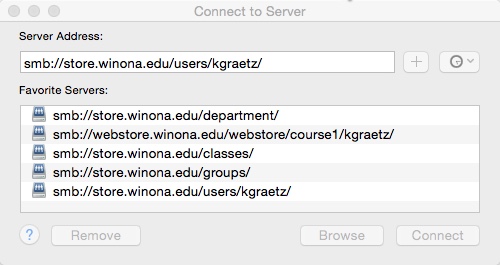Local network storage
About this article
This article provides an overview of the various local network storage options available to the campus community. It is intended for students and employees.
What's local network storage?
Local network storage refers to space, located on networked servers located on the Winona campus and administered by WSU staff, reserved for students and employees to use to store their files. WSU maintains several servers intended for the local storage of student and employee files. You can access this storage from on campus and from off campus using VPN. Here is a list of all the local network storage options:
Personal storage (employees only)
Every employee has 4 GB of personal network storage on a local campus network server. PC users know this as their R drive (Fig 1). Mac users connect to smb://store.winona.edu/users/[your username] (Fig 2). You can use your personal drive to store any work-related file, but it is highly recommended for private university data (e.g., student grades, employee performance reports).
Department storage (employees only)
Depending on the department to which they belong, employees have shared access to one or more network folders, along with other members of the department (i.e., files are not private). PC users know this as their S drive (Fig 1). Mac users connect to smb://store.winona.edu/department (Fig 2). You can use your department drive to store any work-related file, but it is designed to provide access to common files that need to be shared within the department. It can also be used to store private university data (e.g., student grades, employee performance reports). However, keep in mind that others in the department have access to these files.
Web storage
All students and employees have access to their own folder on a campus Web server. Some PC users may refer to this as their W drive (Fig. 1). Student Mac users connect smb://webstore.winona.edu/webstore/StudentWebs/[username] and employee Mac users connect to smb://webstore.winona.edu/webstore/course1/[username]. Every file you place in this drive is available to the world through the Web. You can connect to this drive and save files to it just like you would any other network drive. Because this is a specialized drive used to post Web content, there are a few more steps to using it. Please refer to the articles below for more detailed information:
- Students: How to access and use your StudentWebs folder
- Employees: How to access and use your Course1 folder
Class storage
An instructor can request that a network storage directory or folder be created for the duration of a course that is only accessible to the instructor and students of that course. Each student has a personal subfolder and there is a shared folder that everyone can use. These files are also accessible via web browser by the account owner.
What can be saved to local network storage?
- Local network storage is intended for university-related use only. Do not store your personal files (e.g., iTunes music, family pictures, vacation videos) to any network storage directory. Please consult the personal versus work-related laptop and tablet use article for more information about the handling of personal files.
Connecting to network storage
PC and Mac users connect to their network drives differently.
PC users
For PC users, all network drives will connect automatically and be visible when they select the This PC icon or the File Explorer icon if they start their laptops on our campus network. If they start their laptops while off campus, they will need to connect to VPN and run the Click-to-Map-Drives program in order to see and access the drives.
Mac users
Mac users connect to their network drives as needed by selecting the Go menu, and then selecting Connect to Server. Enter the path of the drive and select Connect.
Pro tips
- Employees: With the exception of your web or "Course1" folder, local network storage is the only place suitable for the storage of highly-sensitive, private university data.
- Never, never, never store private data in your StudentWebs or Course1 folder. It is open to the world.

